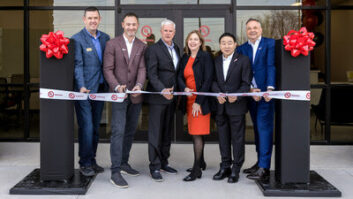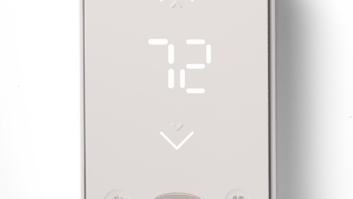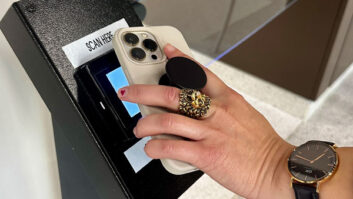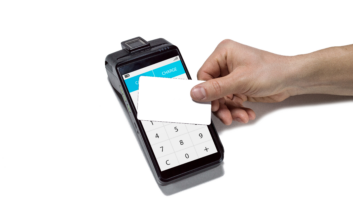NEW YORK – Between Sprint’s dramatic showroom expansion by tag-teaming with RadioShack stores, and new formats from Verizon and AT&T that foment connected – home technologies, mobile carriers are entering a Golden Age of retail.
What’s more, with their high traffic volume, thousands of locations from coast to coast, and their incursions into traditional CE turf, these carrier-operated outlets are giving A/V specialty merchants an increasingly harder run for their money.
The greatest growth opportunity arguably belongs to Sprint, which more than doubled the number of company-owned stores this month when it opened 1,435 Sprint-RadioShack stores, the carrier said.
General Wireless, an affiliate of hedge fund Standard General, acquired 1,743 RadioShack stores in a court-approved bankruptcy sale. Sprint is now a co-tenant in 1,435 of those stores, with Sprint being the primary brand in marketing materials and signage, the new partners said. Sprint will occupy roughly onethird of the retail space at those existing RadioShack locations and will, through the end of the year, work closely with General Wireless to build out Sprint’s “store-within-a-store” merchandising strategy, the carrier continued.
In the coming months, Sprint will also “actively recruit a skilled workforce to fill quality full- and part-time positions” in the stores, the carrier said.
All 1,435 Sprint-RadioShack stores now offer devices and services from Sprint and from the carrier’s Boost Mobile and Virgin Mobile prepaid brands, which were already available in RadioShack stores. All other wireless brands, including prepaid MVNOs TracFone and Net10, get booted out of the 1,435 outlets. T-Mobile isn’t sold through RadioShack.
Earlier this year, Sprint CEO Marcelo Claure called distribution growth “imperative” and said Sprint had fewer Sprint-brand outlets than its competitors.
Consumers “value the ability to walk into a neighborhood Sprint store near where they live and work,” Claure said today.
The stores themselves will initially feature a “faststart” format that uses existing fixtures while carving out a branded section for Sprint, bankruptcy court documents show. A full remodel featuring co-branded signage, an open floor plan and a dedicated Sprint space is expected to roll out pending approval by both partners. All cellular sales will be relegated to Sprint, which will occupy and staff about a third of the sales floor.
Meanwhile, No. 1 U.S. carrier Verizon Wireless continues to evolve its own fleet of 1,700-plus company- owned showrooms. Earlier this month the carrier opened its fourth “Destination” concept store in Boston, its first on the East Coast.
The 8,000-square-foot showcase features more than 1,700 products and accessories, a staff of more than 70 people, and six interactive lifestyle zones, each depicting ways technology can be incorporated into different lifestyles.
The Destination Stores are part of a broader retail initiative that includes the redesign of the carriers’ more than 1,700 retail stores and operational changes within the stores. Redesigned stores, called Smart Stores, are smaller-scale versions of the Destination Store.
A grand-opening celebration in Boston store drew local radio-station DJs, actor and singer Donnie Wahlberg, and pop rap duo Jack & Jack.
Inside, the lifestyle zones are labeled Amplify It, Customize It, Get Fit, Have Fun, Home and on the Go, and Anywhere Business. The Get Fit zone lets customers use products that measure activity, set and maintain fitness goals, and improve sleep habits when paired to a smartphone. Customers can test them out riding an in-store stationary exercise.
The Amplify It zone is a music-oriented area that features headphones and Bluetooth speakers. A Digital DJ Booth lets customers mix and post tracks from a DJ Booth. The Anywhere Business zone includes areas that showcase technology and accessories that support various industries. The Have Fun zone features tech toys including action cameras.
The Home and On The Go section is a connectedhome area where shoppers trial smart-home accessories controlled from a smartphone or tablet.
In the Customize It area, a photo booth lets customers create a customized smartphone case with personal photos and custom colors. The case is built on site while the customer shops.
A dedicated Wireless Workshop training space enables Verizon education specialists to lead free informational classes and use interactive digital displays to help visitors understand the capabilities of accessories and devices.
The store also features multiple charging stations where visitors can top off their batteries, a ‘selfie photo booth’ stocked with props for capturing and editing pictures, and other customizable displays that change periodically.
The Boston shop, at 745 Boylston St., also incorporates photography, murals and other elements inspired by the city’s history, landmarks and culture.
The other Destination Stores are in the Mall of America in Bloomington, Minn. (opened in 2013), Chicago (2014) and Houston (2014). Those stores are 9,715, 10,000, and 12,000 square feet, respectively.
Verizon continues to retrofit company-owned retail locations throughout the country with elements of the Destination Store format.













